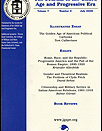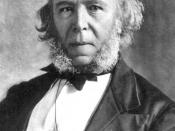The progressive movement sought a series of reforms to address specific social, economic, and political problems. The movement attempted to bring the government into a state where it served all people. Though the amount of reform wanted often varied between the individuals of the progressive movement, some disturbing ingredients that led to its creation remained the same in many. These ingredients, that all too readily could turn repressive and destructive, included an assurance of moral and intellectual superiority, an exaggerated confidence in the social applications of science, and an uncritical acceptance of the use of state power to coerce individual behavior.
The assurance of moral and intellectual superiority came hand-and-hand with the progressive era. The populus of this era was ardent in their beliefs that they, as a people, had matured to a level of morality and intellectuality that far exceeded what the people before them had ever achieved. As human equality progressed in America , ideas such as ' live[ing] quietly side by side with their neighbors...'
and 'neighbors held apart by differences of race and language which the residents can more easily overcome' became more accepted in American society. The idea of woman's suffrage, as described in the Socialist Party's Platform as ' Unrestricted and equal suffrage for men and women', also grew in the progressive era, leading to increased popularity of the women's suffrage movement. Also the formation of the NAACP led to the first signs of a organized civil rights movement. These advancements in minority rights and woman's rights led to a common belief that the nation was morally and intellectually superior than ever before. However, its destructiveness lied in its inaccuracy. The facade of superiority was in truth only hidden feelings, as later proved by the extreme popularity of the KKK in the south.
An exaggerated confidence in the social applications of science also played a predominant role in the progressive era. Spurred on by the rejection of 'Social Darwinism', the progressive movement relied on many social applications of science for its reasoning. 'Social Darwinism' was the theory that in society only the strong survive and the weak eventually die out. However, American society was unable to accept this reasoning, and therefore demanded that government support all people, especially the weak. Theodore Roosevelt's statement ' ...our government, national and state, must be freed from the sinister influence or control of special interests' clearly represented public sentiments of the era. More government support of labor organization and big-business restrictions represented that rejection of 'Social Darwinism', allowing the weak a better chance at success and survival. The formation of the ICC, FDA, and anti-trust legislation represented the government's fight to restrict big-business. The Socialist party's emergence, with beliefs such as 'The further conservation and development of natural resources for the use and benefit of all the people..' further showed the rejection of 'Social Darwinism'. The acceptance and implementations of Eli's 'Social Gospel' by such men as Rauschenbush, who wrote ' The chief purpose of the Christian Church in the past has been the salvation of individuals' represented societies want to help the weak. However, danger lied in these sentiments. Though these reforms were made with good intentions, however, at times, the excessive control of government on business seemed to threaten the very theory of 'American capitalism'. As government gets too big, it takes power away from the hands of the people, which violates the basic principles of democracy.
Perhaps the most dangerous beliefs of the progressive era may be the uncritical acceptance of the power of state to coerce individual behavior. The idea of individuality, which is vital for democracy, seemed, at times, to be threatened. This acceptance of the government's control over its nation's individuality opened the door for the surge of socialist views. The idea of a 'cooperative commonwealth' began to take it's roots in American society. Such socialist ideas and government control over individual behavior was very easy to sell to the poor working class, which made up a high percentage of America, who had become over-burdened by capitalist oppression. The government's ability to gain strength was looked upon by this class as the only way to control the overpowering private sector, which was the big-businesses. As Wilson stated 'Our duty [government] is to cleanse, to reconsider, to restore, to correct the evil without impairing the good, to purify and humanize every process of our common life without weakening or sentimentalizing it.' .In the idea of government controlling 'every process of our common life' lies a great danger; the control of government lying in the hands of the people, not the other away around, is essential for democracy.
Though the progressive era was one that attempted to progress American society, the acceptance of moral and intellectual superiority, and exaggerated confidence in the social applications of science, and an uncritical acceptance of the use of state power to coerce individual behavior, which were the seeds of the progressive movement, could readily be interpreted as repressive and destructive. Through these beliefs, the increased strength of the government threatened democracy itself.


